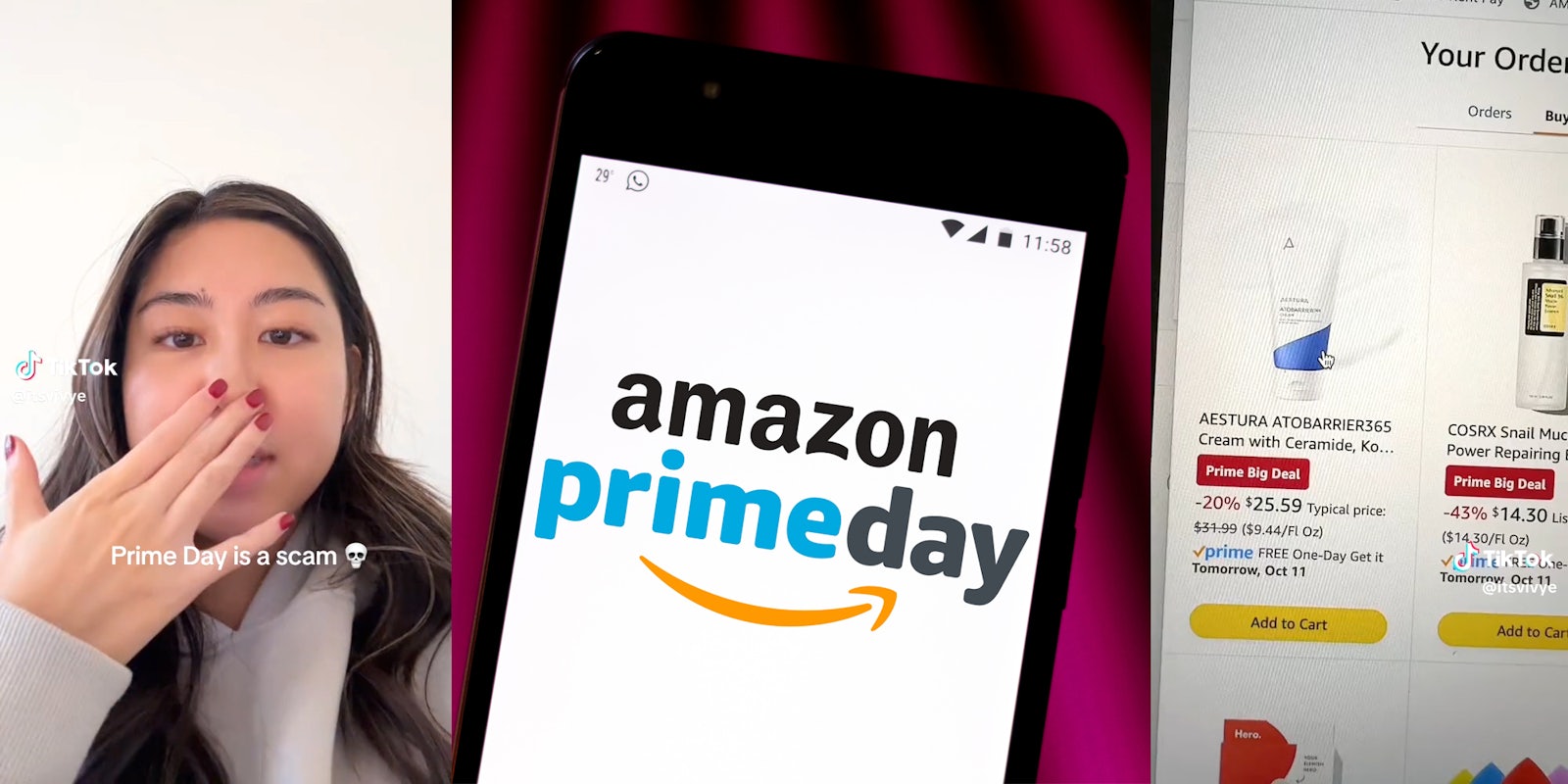In a TikTok video that has drawn the attention of over 1.2M viewers, user Vivian (@itsvivye) dives into a perplexing pricing predicament during Amazon’s much-anticipated Prime Day. Her clip sparked a lively discussion about perceived discounts, consumer trust, and the subtle complexities of online retail pricing. With a caption that playfully declares, “Girl math ain’t mathing!” Vivian takes viewers on an eye-opening journey through her online shopping experience surrounding the much-anticipated shopping event.
“Yo Prime Day is such a damn scam, like, look, OK?” Vivian says, before showing a screenshot of the face cream she typically orders.
“So, this is a face cream I usually use and they’re saying ‘Prime Big Deal’ 20% off, right? So, $25.59. And I was like, wait, that doesn’t even sound cheaper,” Vivian skeptically narrates, showing her viewers the proof in her shopping cart. She proceeds to compare the “deal” price with a previous price from her history, revealing them to be identical.
“Moral of the story is that Prime Day is a scam. Don’t do it,” she concludes.
Communal Commiseration: Consumers’ Shared Experience
The comments section quickly became a hub of shared experiences, tips, and collective eye-rolling at the sneaky pricing scenario.
“Omg I bet they mark up the price leading up to prime day so it seems like it’s on sale on the day,” speculated one user.
Another shared a pro tip: “I have the browser extension ‘keepa’ and it tracks all the prices of all time & I can tell you nothing is on sale for prime day.”
Gratitude was also expressed. One user noted, “I needed to hear this honestly. I was about to buy a million things, thanks for saving me money.”
Convenience Conundrum: How Retail Giants Navigate the Line of Trust and Profit
Vivian’s TikTok, while mostly cheeky, subtly highlights a broader issue: the delicate balance that retail giants like Amazon must navigate between offering genuine deals and maintaining profit margins, especially during high-profile sale events like Prime Day. The incredible convenience and array of products offered by platforms like Amazon often mean that consumers pressed for time and enticed by the promise of significant savings may not scrutinize prices as closely as they might in a physical store.
In a world where time is as precious a commodity as money, many consumers may prioritize convenience, placing trust in the retailer to provide genuine offers. A recent poll even showed that some consumers trust Amazon more than the Federal Government. This trust, once eroded, can be challenging to regain, posing a potential risk to retailers who may be perceived as playing fast and loose with pricing and discounts. However, many customers will dismiss pricing inconsistencies for the overall good experience they have using the platform.
@itsvivye girl math aint mathing!!! #amazonprine #primeday #girlmath ♬ original sound – vivian
Vivian’s video serves as a gentle reminder of the importance of informed consumerism, encouraging viewers to peek behind the curtain of flashy sale banners and dig a little deeper into the true value of “deals” presented by retail giants. It nudges consumers to question, verify, and ensure that their hard-earned money is being spent wisely, even amidst the convenience of one-click shopping.
In an era of digital retail, where convenience often trumps thorough price comparison, perhaps the real “Prime Deal” is maintaining a healthy skepticism and ensuring that our shopping habits are as savvy as our scrolling.
The Daily Dot has reached out to Amazon via email and Vivian via TikTok comment for further information.
Update 9:14am CT, Oct. 14, 2023: In an email to the Daily Dot, an Amazon spokesperson shared the following:
“There is no scam, and to suggest we’re trying to mislead customers is inaccurate. Amazon offered this product on a great deal during both Prime Day and Prime Big Deal Days.”
They also shared the product’s current price after the discount on Amazon.com.
“Every deal in our store must offer trustworthy savings for customers as compared to verifiable reference prices, whether it’s a regular shopping day or during one of Amazon’s major deals events, such as Prime Big Deals Day, Prime Day, Black Friday, or Cyber Monday,” the spokesperson shared. “Using verifiable reference prices is a standard practice in the retail industry and we continuously work to validate these prices and ensure they are credible.”
They explain how all deals are based on “validated reference prices” Amazon confirms customers have recently paid on Amazon or its competitors.
“All deals provide the lowest price offered to customers in the last 30 days,” they wrote.


